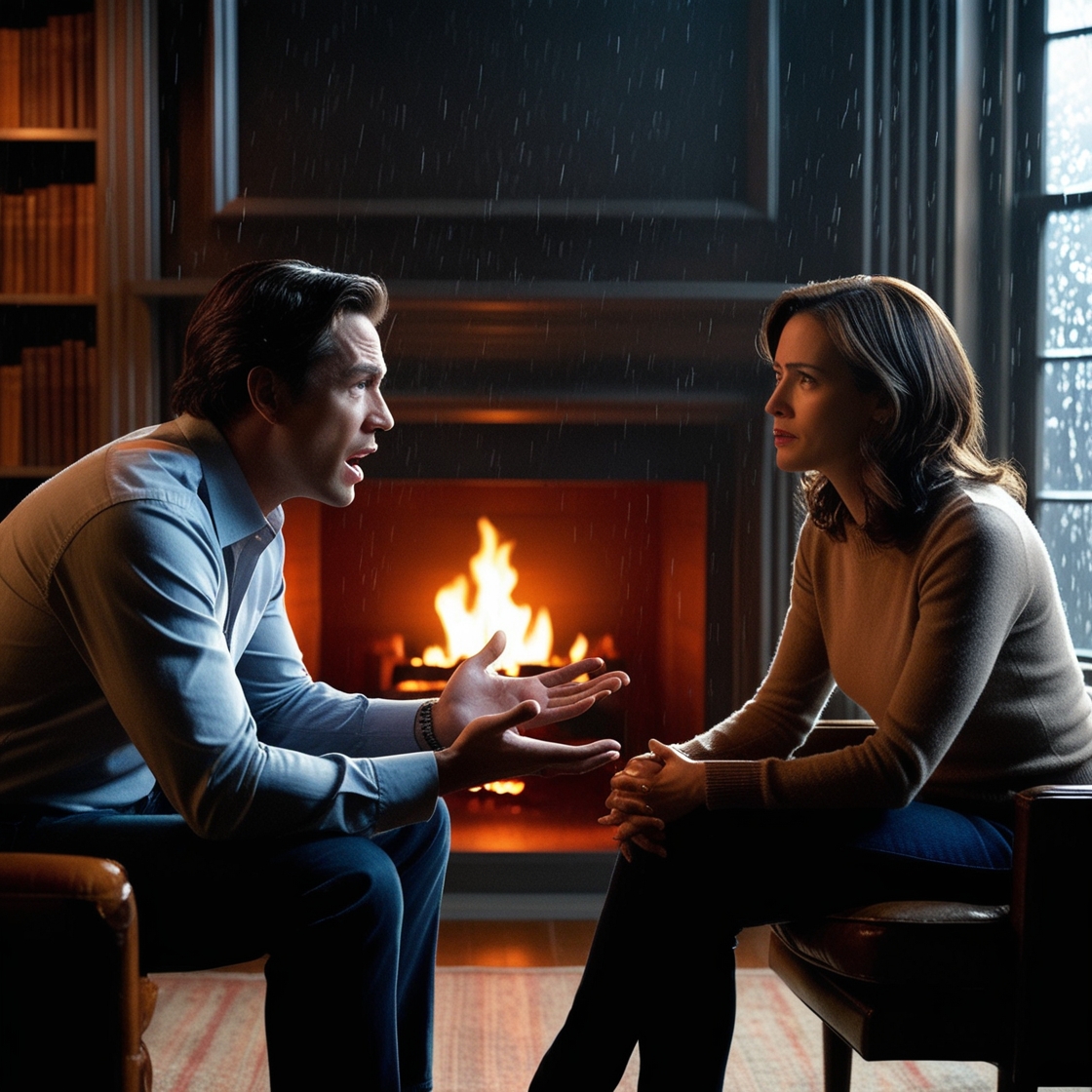The rain tapped lightly against the window, as though afraid to intrude on the tense silence that had fallen over the room. The fire crackled in the hearth, throwing flickers of light onto the faces of a man and a woman seated across from each other, their expressions a portrait of quiet resolve.
“It’s not that I don’t think women can love deeply,” began Elias, his voice calm but carrying the weight of conviction, “But I believe that the nature of a man’s love is different—more…unconditional.” He leaned forward slightly, his eyes fixed on his wife, Lydia, as if daring her to refute him.
Lydia, seated with her hands folded in her lap, met his gaze with steady patience. She tilted her head, a small smile playing at the corner of her lips, not yet ready to dive into the heat of the argument.
“And why do you think that?” she asked, her voice soft, as though coaxing a confession out of him. “What makes a man’s love unconditional, while a woman’s is not?”
Elias exhaled deeply, a hint of frustration seeping into his features. “It’s simple. Men are capable of loving without need, without expectations. A man’s love—true love—exists even in the face of hardship, rejection, even betrayal. We endure. We don’t seek affirmation or proof of love in return. Isn’t that the definition of unconditional?”
Lydia’s smile faltered slightly, but her eyes remained sharp. “And you think women cannot love in this way? That we are somehow dependent on… conditions?”
Elias hesitated. “I think women are more attuned to emotions, more aware of the state of the relationship, the ebb and flow of affection. You—” he gestured toward her, as though speaking for her entire gender, “are more likely to love as long as your needs are being met. When those needs aren’t fulfilled, doesn’t love become strained?”
Lydia raised an eyebrow. “And what of men? Are you saying that men, with all their ‘unconditional love,’ do not have needs? That they do not seek fulfillment in their relationships?”
“Not in the same way,” Elias replied, his voice growing firmer. “Men endure loneliness, rejection, even neglect—without the need for constant affirmation. We’re willing to love even when everything falls apart.”
Lydia leaned back in her chair, her expression thoughtful. “And yet,” she began slowly, “aren’t men’s actions often shaped by those very conditions you claim they transcend? A man’s pride, his need to provide, to protect—aren’t these all conditions that shape the way he loves? What happens when those roles are challenged, or when they’re not met?”
Elias opened his mouth to respond, but she held up a hand, continuing. “You say men endure rejection. But how many men can truly love after they’ve been deeply wounded? When their sense of pride is shattered? I think men love just as conditionally as women do, but their conditions are often tied to their sense of identity, their place in the world.”
Elias shook his head. “No. You’re reducing it to ego. But love—real love—transcends that. When a man truly loves, it’s not bound by his role as a provider or protector. It’s something deeper.”
Lydia’s eyes softened. “I’m not saying men don’t love deeply. But let me ask you this—if you lost everything, if you could no longer fulfill the role society expects of you, if you couldn’t provide or protect… would your love truly remain untouched? Or would it wither as well?”
For a moment, Elias didn’t answer. The fire crackled between them, its warmth a stark contrast to the chill in their words. He looked away, considering her question.
“I would still love,” he said finally, his voice quiet. “Even if I lost everything.”
Lydia nodded, as though she had expected that answer. “Perhaps you would. But I wonder,” she said softly, “if that love would look the same. If it would feel the same.”
She stood, smoothing her skirt as she walked to the window, her back to him. “We all love conditionally, Elias. Men and women alike. The conditions may differ, but they’re always there. Perhaps it’s not a failing; perhaps it’s just part of being human.”
Elias watched her, the weight of her words settling over him. For a long moment, he said nothing.
Then, quietly, he stood as well, crossing the room to stand beside her. He placed a hand on her shoulder, and for the first time that evening, his expression softened.
“Maybe you’re right,” he said softly, his voice a whisper against the rain. “But I still believe that, in the end, men are capable of loving without needing anything in return.”
Lydia turned to face him, her eyes searching his for a moment before she nodded. “Perhaps,” she murmured. “But whether that love is truly unconditional, or simply a reflection of something else… only time can tell.”
Elias smiled, the tension between them fading into the quiet of the room. “Perhaps,” he echoed, though a part of him still clung to the certainty that a man’s love, in its purest form, could indeed stand alone, unbroken by the tides of condition or circumstance.
And though Lydia did not press the matter further, she couldn’t shake the belief that in love, as in life, no heart—man or woman—was ever truly free of conditions.
But for now, Elias felt he had won, and in that victory, he found peace.

